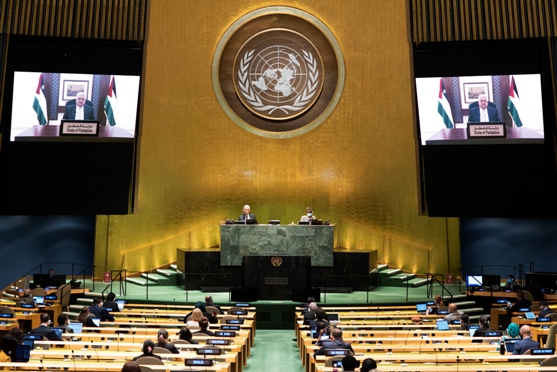By Rick Gladstone
UNITED NATIONS – Weary of repeating his people’s long-standing grievances with Israel, the Palestinian leader used his United Nations General Assembly speech on Friday (25) to request an international conference in early 2021 “with the participation of all concerned parties”.
The request by the leader, President Mahmoud Abbas of the Palestinian Authority, appeared to reflect an acknowledgment that the ground had shifted significantly in Israel’s favour over the past year, threatening to marginalize the Palestinians in a struggle that is nearly as old at the United Nations itself.
“I wondered while preparing this statement what more I could tell you, after all that I have said in previous statements, about the perpetual tragedy and suffering being endured by my people,” Abbas said. The pre-recorded speech was sent from his office in Ramallah, in the Israeli-occupied West Bank, to the annual gathering, held virtually this year because of the coronavirus pandemic.
Abbas spoke against the backdrop of changes that could redefine the power dynamics in the Middle East, notably recent agreements to establish diplomatic relations between Israel and the United Arab Emirates and Bahrain. The two Gulf States are the first Arab governments to recognize Israel in more than 25 years.
Those agreements were brokered by the Trump administration, which has heavily favoured Israel in its Middle East policies while seeking to portray itself as a groundbreaking peacemaker in one of the world’s most volatile regions.
Abbas and his associates have denounced those agreements, accusing the United Arab Emirates and Bahrain of betraying Arab solidarity and undermining the Palestinian aspirations for statehood. Abbas has also ridiculed the Trump administration’s peace proposal, which would give chunks of the occupied West Bank to Israel and leave the Palestinians non-contiguous territory and the possibility of a state with limited sovereignty.
Abbas reiterated his criticisms in the General Assembly speech, asserting that “the only path” toward an Israeli-Palestinian peace agreement requires Israeli withdrawal from occupied lands, an independent Palestine along Israel’s pre-1967 borders, and East Jerusalem as its capital.
With that goal in mind, Abbas said, he was asking Secretary-General António Guterres to make preparations “to convene an international conference with full authority and with the participation of all concerned parties, early next year, to engage in a genuine peace process, based on international law.”
It was not immediately clear whether such a conference would, in fact, be undertaken. Among the many variables is the uncertainty over whether President Donald Trump will be reelected in November. His Democratic opponent, Joe Biden, is also a strong supporter of Israel but has long backed a two-state solution to the conflict and has criticized Israel’s settlements in occupied territory.
In different feud on UN agenda, Pakistan’s leader unloads on India
Imran Khan, the prime minister of Pakistan, devoted a large portion of his pre-recorded speech aired Friday to assail India, reflecting the entrenched antagonism between the two nuclear-armed neighbours. They have fought four wars since the creation of Muslim-majority Pakistan and Hindu-majority India in 1947.
Khan accused his Indian counterpart, Prime Minister Narendra Modi, of having replicated the Nazis’ extremist ideology through his Hindu nationalist agenda and association with a right-wing Hindu group known as the RSS.
“While the Nazis’ hate was directed at the Jews, the RSS directs it toward the Muslims and to a lesser extent toward the Christians,” Khan said. He further accused Modi of having imposed a “military siege” on the disputed Kashmir region, which is populated predominantly by Muslims and is the chronic flash point of India-Pakistan strife.
Under Modi, whose General Assembly address is not scheduled until Saturday, Kashmir’s autonomous powers were revoked a year ago in what critics saw as an undemocratic move aimed at further dominance by Hindus. India rushed troops into Kashmir and for a time imposed a total communications lockdown.
India’s UN ambassador, T.S. Tirumurti, reacted furiously to Khan’s speech and said India had requested a right of reply, the General Assembly procedure for member states to respond. “Another litany of vicious falsehood, personal attacks, war mongering and obfuscation of Pakistan’s persecution of its own minorities & of its cross-border terrorism,” the Indian envoy said on Twitter.
Kashmir remains an especially volatile subject in both countries. On Thursday (24), an outspoken Kashmiri human rights lawyer, Babar Qadri, who frequently tangled with the Indian authorities, was shot to death in his home, making him one of the most high-profile casualties of the violence there.
-New York Times


